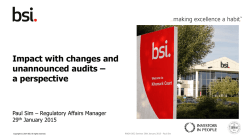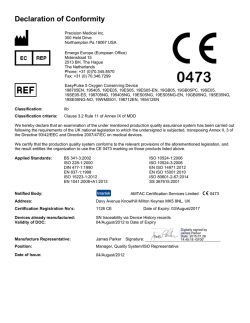
BSI intro v10 - Water UK Standards Programme
Introducing standards raising standards worldwide TM Introducing standards Standards matter. They contribute at least £2.5bn each year to the UK economy and play a key role in enabling innovation, improving competitiveness, increasing reliability, ensuring safety, improving accessibility, controlling quality, managing risk and improving business performance. As the world’s first Strategy (Leadership) Assist senior ‘Next practices’, innovation, lasting national standards management improvements, integrated/cross function Advisor in developing solutions, pushing the limits body, BSI British ‘next practices’ (strategic solutions) Processes Vision Standards has a globally recognised Tactics (Operational advantages) Implement & assist Best practices, management processes, development of Partner reputation for systems and frameworks “new” best practices independence, Mechanics (Operational ‘hygiene’) integrity and Minimum requirements, minimum Show vision, performance level, compliance with rules Leader & leadership and constant innovation. It is also and regulations, ‘levelling of Authority improvement the playing field’, kite marks, quality assurance a leading provider of standardization and Figure 1: Role of consortia services through BSI Professional British Standards Services. Part of the BSI Group operating in 86 in adding value markets worldwide, British Standards serves the interests of a wide range of industry sectors, as well as government, consumers, employees and society overall to make sure not just British but European and international standards are useful, relevant and authoritative. What is a standard? A standard is a document defining best practice, established by consensus and approved by a recognized body (such as BSI). Each standard is kept current through a process of maintenance and review whereby it is updated, revised or withdrawn as necessary. Intellectual property generation & value add Standards Product development & commercialisation Pure research Science Base Figure 2: Role of standards in supporting technology Applied research and development Technology Applications Markets Pull through from R&D to market Standards are designed to set out clear and unambiguous provisions and performance objectives in order to help trade and communication but may also meet other needs. For example, they might improve the use of resources, assist with bringing products from development to market, stimulate innovation through the quick and efficient dissemination of critical information, or improve the quality of life through health, safety and environmental requirements. Although standards are voluntary and separate from legal and Regulatory systems, they can be used to support or complement legislation. Some European Standards have been developed to support certain European (EU) directives by providing the simplest way of proving conformity. These standards in many cases are performance based rather than prescriptive. BSI manages UK interactions with the standards bodies for Europe: the European Committee for Standardization (CEN) and, through the British Electrotechnical Committee, the European Committee for Electrotechnical Standardization (CENELEC). Similarly, BSI is the British point of contact for the worldwide standards bodies: the International Organization for Standardization (ISO) and, through the British Electrotechnical Committee, the International Electrotechnical Commission (IEC). The standards making process Standards are developed when there is a defined market need through consultation with stakeholders and a rigorous development process. New areas for standardization are often developed through fast-track mechanisms like the publicly available specification (PAS) via BSI Professional Services. Formal standards in more mature areas are developed through a committee structure that operates at the national, European and international levels. For fast track standards, stakeholders are drawn together in a consortium model where consultation takes place through steering groups and review panels chosen to be representative and close to the business issues, and also through any standing committees in related areas. For formal standards, national committees represent their communities in order to develop standards and related documents by consensus. They include representatives of government, testing laboratories, suppliers, consumers, academic institutions, societal interests, business, manufacturers, regulators and trade unions. European and international committees represent the countries interested in the subject matter with the aim of reaching consensus, through expert delegations nominated by the relevant national standards bodies. BSI supports almost 2,500 technical and subcommittees which between them have more than 22,500 places. BSI also provides the secretariat to over 200 European and international committees, and publishes 2,000 new or revised standards per annum as part of its current library of 27,000 standards. BSI Professional Services has set up over 40 fast track-standardization projects and published more than 90 PAS’s as the commissioned route to standardization has seen rapid growth in the last few years. Types of standard Consensus ISO/ IEC European Standard Benefits: Consumer Awareness Marketing Potential Risk Management Credibility British Standard Types of documents: Technical Specifications Codes of Practice Method Guide Publicly Available Specification Private Standard Figure 3: The standards control/consen sus dynamic Company Manuals Control Formal British (BS), European (EN) and international standards (ISO/IEC) are developed according to strict rules to ensure that they are transparent and fair. They follow the technical committee process which incorporates the following stages: • • • • • • Proposal for new work Project acceptance Drafting Public comment period Approval Publication. There is, however, also a range of other documents with partial consensus: • Draft for development – DD • Guide – European Committee for Standardization CEN/CLC, or ISO • Technical specification – CEN/CLC/TS, ISO or IEC/TS • Technical report – CEN/CLC/TR, ISO or IEC/TR. For some users of standards, particularly those in fast-changing technology sectors, it is often more important to agree on a business solution and publish it quickly before going through the checks and balances needed to become a full consensus standard. Therefore, BSI, CEN / CENELEC and ISO / IEC have developed a range of products which are not full standards but allow publication before full consensus. These publications are: • Publicly available specification – PAS (the new deliverables of fasttrack standardization) • Private standard – PS (commissioned by specific organisations) • international publicly available specification – ISO/PAS • European or international workshop agreements – CWA/IWA/ITA • business related books, CD-ROMs (e.g. Guides, Codes of Practice, compliance workbooks, text targets, surveys etc) • Published document – PD. Lead times for standards vary from a matter of months to several years. British standards are usually developed within 12–15 months, whilst international standards take around 3 years. Commissioned standards such as PAS and PS can be developed within months to meet customer requirements. Figure 4: The standards cycle Shared (standards of general relevance) Continuous improvement in existing standards provision Developing standards of industry-wide relevance Process-driven Vision-driven Collecting best practice industry-wide or cross-industry to create new standards Assisting companies in developing private standards Private (company-specific standards) Committees and consortia BSI committee UK delegation UK expert ISO/IEC or CEN/CENELEC technical committee or subcommittee ISO/IEC or CEN/CENELEC working group Figure 5: International representation British Standards facilitates the development of full consensus standards through committees representing interested parties. Committee membership is voluntary and DTI funding is available for some activities. Complementary to this, BSI Professional Services facilitates a full range of collaborative and consortia services which are funded directly by participating organisations. Committees develop national standards and provide the UK input to international projects. BSI staff, Programme Managers and Committee Managers provide defined levels of support to the committees based on an agreed allocation of service that has been calculated according to the levels of importance and activity of the committee’s current work programme. For national projects additional support is provided by editorial staff, Content Developers. Delegates and experts to international committees and working groups are nominated by national committees. Consortia develop the fast track new deliverable like PASs as well as offering a full range of support services like post standardization marketing and PR. There are state-of-the-art meeting facilities at BSI’s Head office in Chiswick and committee interactions are facilitated by a modern electronic working environment ‘eCommittees’ that has been developed by BSI specifically for that purpose. All committees meet as often as required but the increase in electronic working means more standardization work is being done without meeting around a table. Consortia can be facilitated at BSI, client premises, or third party venues as required. BSI committees usually include representatives from trade associations, academic institutions, government departments and other interested groups. Companies may nominate people to committees through their trade association. If someone has a specific area of expertise, a committee may co-opt them for a specific task or an allotted time. A member of a UK committee may be nominated or appointed to attend international meetings either as a UK expert to a working group or as a national delegate to a technical committee or sub-committee. Similarly BSI consortia can commission expert input. Benefits of participation The development of standards requires specialist knowledge and a range of skills for which BSI provides world-class training. Although participation in standards making is voluntary and unpaid, committee members and experts benefit from helping to develop standards by: • influencing the content of standards • gaining detailed advance knowledge of standards and so anticipate requirements and trends • getting to know peers and others who influence industry such as the business community, consumers, users, government and regulators • winning recognition through association with leaders in the field and in media coverage promoting the standard • being nominated for European or international committees. Members of BSI fast-track standardization consortia derive key business benefits including: • brand visibility and credibility by sponsorship of good practice • strategic influence of standards in emerging new areas • cost reduction, risk management, and product or service differentiation. Further information Several publications describe the benefits of using standardization to achieve broader organisational and national strategic objectives. Information about these is available both from BSI and the National Standardization Strategic Framework (NSSF www.nssf.info), a joint initiative between BSI, the Confederation of British Industry (CBI), the Department for Trade and Industry (DTI) and the United Kingdom Accreditation Service (UKAS). The website at www.bsi-global.com describes the work of BSI and gives a range of information on British Standards. Projectline, the free service that enables anyone to search for British Standards, is at http://webserv.bsi-global.com/projectline/ Public information on national committees and access to documents in the public domain are on www.bsi-global.com/Committee_Members/Ecommittees/index.xalter Case studies of working with BSI Professional Services to add value to businesses are available at: www.bsi-global.com/ PSS/About/index.xalter BSI Group headquarters 389 Chiswick High Road London W4 4AL Tel +44 (0)20 8996 9000 Fax +44 (0)20 8996 7400 www.bsi-global.com
© Copyright 2026


